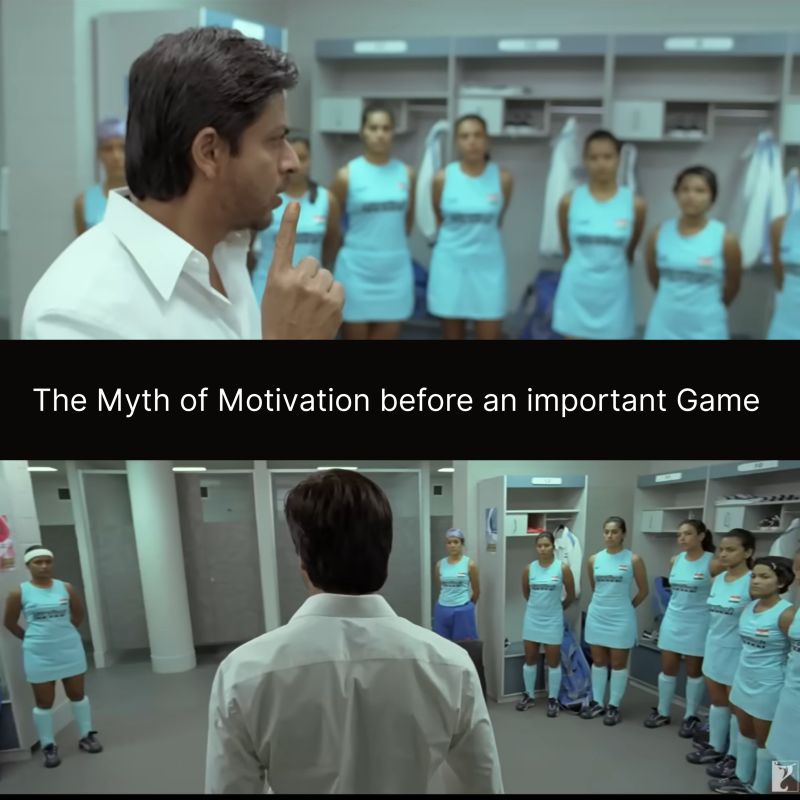The Reality of Pre-Match Motivation
We’ve all seen it in movies: the coach walks into the locker room, the music swells, and suddenly the team is on fire, ready to conquer the world. “Chak De! India!” rings out, and every player feels like a hero.
But let’s be real for a moment—how often does that really happen in everyday sports?
Motivation in sports performance doesn’t always come from a dramatic speech or an epic moment. Most athletes don’t need a pep talk before every game—they need something much simpler: a steady, focused mindset that helps them execute what they’ve trained for.
Think about it: if every match required a locker-room speech to “fire up” players, athletes would quickly become dependent on hype rather than building true mental resilience.
Studies and real-world experience in sports psychology show that excessive pre-game motivation, especially last-minute instructions or emotional speeches, can actually backfire.
It can overload the mind, make players anxious, or even distract them from the fundamentals they already know. So yes, locker room speech effectiveness is real—but it’s highly situational and far more subtle than Bollywood makes it seem. And that’s exactly why platforms like MyMentalCoach focus on building lasting mental skills, not temporary hype.
From Pre-Match Motivation to Psychology Insights and Practical Coaching Strategies
When we talk about pre-match motivation, most people think of energy, hype, and firing athletes up just before the whistle. But if you watch top performers closely, you’ll notice something different. Their preparation often looks calm, even ordinary. That’s because what matters isn’t hype—it’s the habits that athletes build through pre-match mental routines and game day rituals for athletes.
These routines—like listening to a particular song, repeating a mantra, or visualizing the first play—create a pre-performance mindset that helps athletes feel in control and steady, no matter how big the stage.
Research in sports psychology for coaches backs this up. Studies on managing pressure in competition show that too much emotional arousal or last-minute instruction can actually reduce focus and concentration in sports.
If you want to learn more about anxiety and pressure in sports, read this article titled “How to Reduce Anxiety in Athletes?” and you’ll get a better idea of the same, along with management techniques.
When athletes are overloaded, their working memory becomes cluttered, and they struggle to execute even well-trained skills.
That’s where psychological skills training for athletes—like breathing techniques, visualization, and attentional focus drills—makes a huge difference. These tools train athletes to stay centred when the pressure spikes.
So, what does this mean for coaches in practice? It means that long speeches right before a match aren’t the magic formula. Instead, the most effective athlete motivation strategies are surprisingly short and simple.
Think of a few short motivational cues for athletes—a single word, a reminder of the plan, or even a look that signals trust. These cues only work if they’ve been built into training sessions; on game day, they simply reinforce what the athlete already knows.
This is where motivational techniques for coaches need a mindset shift. The role isn’t to add more energy but to fine-tune it. Some athletes walk into a match too relaxed—they need a nudge of urgency.
Others are buzzing with adrenaline—they need calming words, or sometimes no words at all. That’s why effective coach-athlete communication is less about volume and more about precision. It’s not “what can I say to inspire them?” but rather “what do they need to hear to be at their best right now?”
In my experience, the best coaches don’t try to be motivational speakers. They act as mirrors, helping athletes reflect on the work they’ve already put in.
They know when to step back, when to say a single line, and when to simply let silence do the work. That’s real coaching psychology in action—helping athletes walk onto the field not pumped up beyond control, but grounded, focused, and ready to perform.
At the end of the day, pre-match motivation isn’t about creating fireworks in the locker room. It’s about steadying the flame that’s already been burning through weeks of training. When routines are trusted, psychology is applied, and communication is clear, athletes don’t just survive pressure—they thrive in it.
Where Coaches Go Wrong with Pre-Match Motivation
One of the most overlooked coaching tips for motivation is knowing when to stop. Many well-meaning coaches think their job on match day is to fill every quiet moment with talk. But silence isn’t a problem—it’s often exactly what an athlete needs. The obsession with “saying something powerful” can backfire, leading to over-coaching in sports. Athletes don’t need brand-new strategies right before stepping out; what they need is space to centre themselves and trust their training.
Another common pitfall is misjudging the locker room speech effectiveness. A coach may deliver a long, emotional speech that feels good to give, but it may not serve the athlete in that moment.
These common coaching mistakes come from good intentions but ignore the simple truth: athletes respond differently under pressure. Some need grounding, others need sharpening—but almost none need a monologue.
The real art lies in reading the athlete’s state and matching the message to their needs, not to the coach’s urge to “inspire.”
Watch this video titled The Biggest Mental Mistake Made by Coaches and Athletes to know the common mistakes coaches make unknowingly, and how you can avoid them to ensure better performance for your athletes.
Conclusion: The Job of a Coach on Match Day
At the end of it all, motivation in sports performance is less about goosebumps and more about giving athletes what they truly need: clarity, steadiness, and belief in the work they’ve already done. Match day isn’t the time for reinvention or last-minute magic tricks.
It’s about trusting the systems and routines that have been practiced day in and day out. That’s why the best-performing athletes are those who learn to rely on consistency over motivation. The hype fades quickly; consistency carries them through the toughest innings, matches, or races.
Coaches often forget that the ultimate goal is not to create a moment of excitement but to build mental toughness in athletes.
That toughness doesn’t come from one speech; it comes from repeated exposure to pressure in training, psychological skills that have been drilled, and the ability to stay calm when the stakes are high.
On match day, the coach’s role is to make sure athletes are not distracted by noise—internal or external—but are tuned in to the right things.
This is where the balance between focus vs hype in sports becomes critical. Too much hype can make players jittery and error-prone; too little focus can leave them flat.
Coaches who can read the mood of their team and adjust—sometimes by saying less, sometimes by reminding them of one simple anchor—create the environment where athletes can truly perform at their best.
If you’re a coach who wants to master this skill, MyMentalCoach has something for you: We run a one-day intensive course on mental training for athletes, designed to give you practical tools that you can immediately apply with your team. You’ll learn how to sharpen focus, build consistency, and enhance your players’ mental resilience without relying on hype. 📞 Call us at +91 9823791323 to learn more and reserve your spot.



Absolutely great ,insights Dr Swaroop! So helpful.
Thank you Mr. Padiyar!